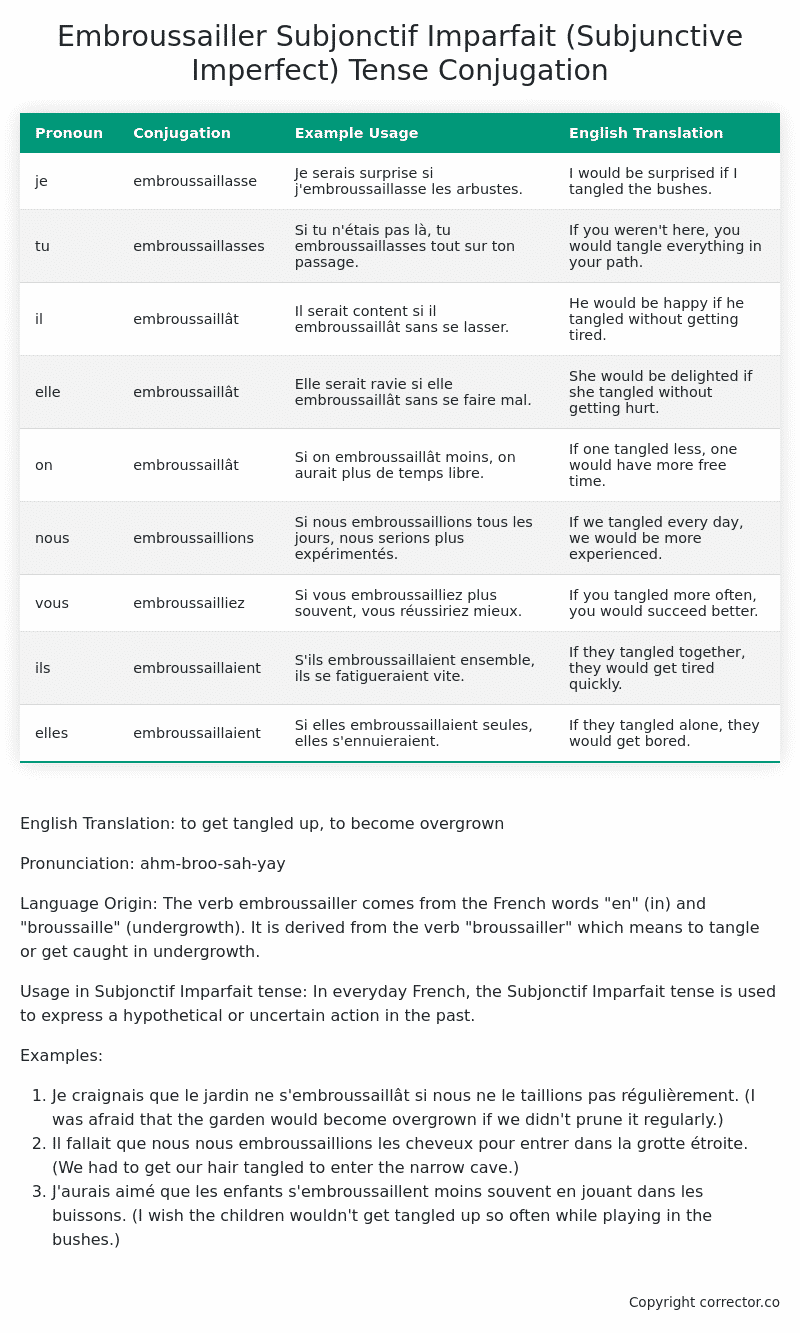Subjonctif Imparfait (Subjunctive Imperfect) Tense Conjugation of the French Verb embroussailler
Introduction to the verb embroussailler
English Translation: to get tangled up, to become overgrown
Pronunciation: ahm-broo-sah-yay
Language Origin: The verb embroussailler comes from the French words “en” (in) and “broussaille” (undergrowth). It is derived from the verb “broussailler” which means to tangle or get caught in undergrowth.
Usage in Subjonctif Imparfait tense: In everyday French, the Subjonctif Imparfait tense is used to express a hypothetical or uncertain action in the past.
Examples:
- Je craignais que le jardin ne s’embroussaillât si nous ne le taillions pas régulièrement. (I was afraid that the garden would become overgrown if we didn’t prune it regularly.)
- Il fallait que nous nous embroussaillions les cheveux pour entrer dans la grotte étroite. (We had to get our hair tangled to enter the narrow cave.)
- J’aurais aimé que les enfants s’embroussaillent moins souvent en jouant dans les buissons. (I wish the children wouldn’t get tangled up so often while playing in the bushes.)
Table of the Subjonctif Imparfait (Subjunctive Imperfect) Tense Conjugation of embroussailler
| Pronoun | Conjugation | Example Usage | English Translation |
|---|---|---|---|
| je | embroussaillasse | Je serais surprise si j’embroussaillasse les arbustes. | I would be surprised if I tangled the bushes. |
| tu | embroussaillasses | Si tu n’étais pas là, tu embroussaillasses tout sur ton passage. | If you weren’t here, you would tangle everything in your path. |
| il | embroussaillât | Il serait content si il embroussaillât sans se lasser. | He would be happy if he tangled without getting tired. |
| elle | embroussaillât | Elle serait ravie si elle embroussaillât sans se faire mal. | She would be delighted if she tangled without getting hurt. |
| on | embroussaillât | Si on embroussaillât moins, on aurait plus de temps libre. | If one tangled less, one would have more free time. |
| nous | embroussaillions | Si nous embroussaillions tous les jours, nous serions plus expérimentés. | If we tangled every day, we would be more experienced. |
| vous | embroussailliez | Si vous embroussailliez plus souvent, vous réussiriez mieux. | If you tangled more often, you would succeed better. |
| ils | embroussaillaient | S’ils embroussaillaient ensemble, ils se fatigueraient vite. | If they tangled together, they would get tired quickly. |
| elles | embroussaillaient | Si elles embroussaillaient seules, elles s’ennuieraient. | If they tangled alone, they would get bored. |
Other Conjugations for Embroussailler.
Le Present (Present Tense) Conjugation of the French Verb embroussailler
Imparfait (Imperfect) Tense Conjugation of the French Verb embroussailler
Passé Simple (Simple Past) Tense Conjugation of the French Verb embroussailler
Passé Composé (Present Perfect) Tense Conjugation of the French Verb embroussailler
Futur Simple (Simple Future) Tense Conjugation of the French Verb embroussailler
Futur Proche (Near Future) Tense Conjugation of the French Verb embroussailler
Plus-que-parfait (Pluperfect) Tense Conjugation of the French Verb embroussailler
Passé Antérieur (Past Anterior) Tense Conjugation of the French Verb embroussailler
Futur Antérieur (Future Anterior) Tense Conjugation of the French Verb embroussailler
Subjonctif Présent (Subjunctive Present) Tense Conjugation of the French Verb embroussailler
Subjonctif Passé (Subjunctive Past) Tense Conjugation of the French Verb embroussailler
Subjonctif Imparfait (Subjunctive Imperfect) Tense Conjugation of the French Verb embroussailler (this article)
Conditionnel Présent (Conditional Present) Tense Conjugation of the French Verb embroussailler
Conditionnel Passé (Conditional Past) Tense Conjugation of the French Verb embroussailler
L’impératif Présent (Imperative Present) Tense Conjugation of the French Verb embroussailler
L’infinitif Présent (Infinitive Present) Tense Conjugation of the French Verb embroussailler
Struggling with French verbs or the language in general? Why not use our free French Grammar Checker – no registration required!
Get a FREE Download Study Sheet of this Conjugation 🔥
Simply right click the image below, click “save image” and get your free reference for the embroussailler Subjonctif Imparfait tense conjugation!

Embroussailler – About the French Subjonctif Imparfait (Subjunctive Imperfect) Tense
Formation
Common Everyday Usage Patterns
Interactions with Other Tenses
Subjonctif Présent
Indicatif Passé Composé
Conditional
Conditional Perfect
Summary
I hope you enjoyed this article on the verb embroussailler. Still in a learning mood? Check out another TOTALLY random French verb conjugation!


